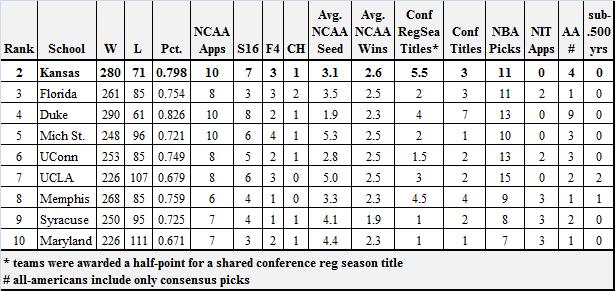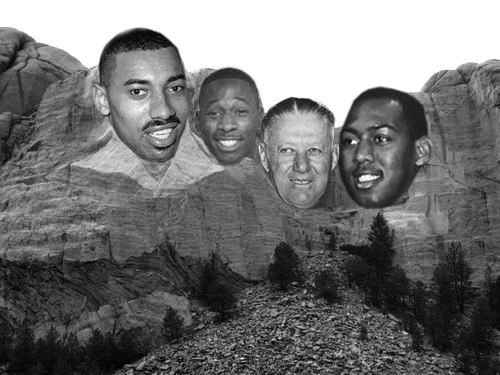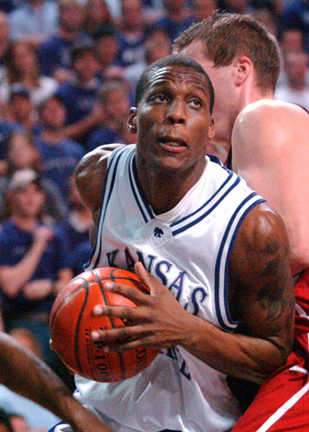Posted by zhayes9 on August 19th, 2009

Ed. Note: Check the category team of the 2000s for our other entries in this feature.
Stepping away from this decade’s rankings for a moment, one could make the argument that the runner-up recipient on our list would top a list of the greatest college basketball programs of all-time. Sure, UCLA and Kentucky fans may quibble, but the combination of legendary players (Lovelette, Chamberlain, Manning, Pierce), pantheon coaches (Naismith, Allen, Brown, Williams) and an arena that every true college basketball fan should visit (Allen Fieldhouse) could surely provide enough ammunition to make an argument to head an all-time list. The successes of this program’s basketball has extended into the current decade, complete with Final Fours, national championship heartbreaks and a comeback for the ages. Let’s take a closer look:
#2 – Kansas

Overview. As one can tell from the chart above, Kansas has been the model of consistency over the course of the decade. Not even a Hall-of-Fame coach departing for his alma mater could deter the Jayhawks program in the 2000s. In fact, Kansas is the only school to reach the top-five in every single category considered, including a runner-up rank in Sweet 16s and Final Fours reached with seven and three, respectively. Other teams on the list have gone without a losing campaign and reached the NCAA Tournament each season, but none of those schools lost a coach midway through the decade. After Roy Williams departed, Kansas made a tremendous hire, luring Illinois coach Bill Self to Lawrence. He’s responded by capturing a Big 12 regular season title each season with the exception of 2003-04, a year in which he finished second and reached the Elite Eight (ho hum). The peak for Kansas may have come in the early part of the decade under Williams, though. The Jayhawk squads from 2001-03 were truly memorable. The 2001-02 club is still the only team in Big 12 history to finish conference play undefeated, a Drew Gooden-led group that finished first in the nation in field goal and winning percentage. A year later, Kansas led the nation in scoring margin and reached the national title game.
Pinnacle. KU’s only national championship in the decade would not have occurred if Derrick Rose or Chris Douglas-Roberts had sunk one more measly free throw during the thrilling 2008 National Championship Game in San Antonio. You know the story: Memphis leads Kansas 60-51 with two minutes left, the national title within their grasp…only to experience heartbreak of the highest order. Give the Jayhawks credit, though, for going perfect from the field and line during those waning minutes. Mario Chalmers’ game-tying three-point shot with 2.1 seconds left will forever be etched in the mind of college basketball fans and may be the single greatest moment in Kansas basketball history (from the wayback machine: RTC’s “morning after” analysis of the game). And that’s saying something. Long known for NCAA Tournament chokes, (we’ll delve into that in a bit) Bill Self finally reached the pinnacle, a pinnacle that is still going strong today. That national title squad was stripped of nearly every contributing player besides sixth man Sherron Collins and little-used big man Cole Aldrich, yet Self’s superb coaching led Kansas to another Big 12 title and Sweet 16 appearance in 2008-09. As the preseason #1 team in the land entering the next decade, the pinnacle has yet to conclude.

Tailspin. Many fans would immediately point to the heartbreaking loss to Syracuse in the 2003 National Championship game (you remember the infamous Hakim Warrick block), a last hurrah for Kirk Hinrich, Nick Collison and Roy Williams gone awry. But I’d be shocked if diehard Kansas fans didn’t select the consecutive first round losses in 2005 and 2006 to Bucknell (as a #3 seed) and Bradley (as a #4 seed) as the lowest points of the decade. The 2004-05 Kansas team completely collapsed after starting the season 20-1 and reaching the top spot in the polls, a squad led by Wayne Simien, Keith Langford and Aaron Miles during Self’s second season. They would go on to lose six of their last nine games before the shocking Bucknell last-second upset. The following season was different yet finished eerily similar. After a rough start, KU rebounded to win 15 of their last 17 games and the Big 12 tournament before falling to Bradley in the opening round. After the loss, Bill Self was labeled a perennial March choke artist and many questioned whether the Kansas program could ever return to prominence.
![4884312_Kansas_v_GT[1]](http://rushthecourt.net/wp-content/uploads/2009/08/4884312_Kansas_v_GT1.jpg)
Outlook for 2010s: Grade: A+. Kansas has returned to prominence. The Jayhawks enter the 2009-10 season as the near-unanimous favorite to raise another rafter in Allen Fieldhouse, a feat that would complete the quickest rebuilding job in the sport’s history. Aldrich appears to be one of the early favorites to win the Naismith Award and Self lured another McDonald’s All-American into the fray for next season in talented wing Xavier Henry, coupled with two more top-ten players at their respective positions in Elijah Johnson and Thomas Robinson to go with Tyshawn Taylor, Marcus Morris and Collins. Self is a recruiting machine and appears to be the frontrunner for Harrison Barnes, the top player in next year’s class. Kansas is the height of the coaching chain and, barring an unforeseen flameout, Self should be the KU coach for years and years to come (especially after rejecting a monster package from his alma mater, Oklahoma State). The March monkey is off his back and the future is extremely bright for one of the most storied programs in college basketball.
| team of the 2000s
| Tagged: aaron miles, bill self, cole aldrich, drew gooden, elijah johnson, harrison barnes, kansas jayhawks, keith langford, kirk hinrich, marcus morris, mario chalmers, nick collison, roy williams, sherron collins, thomas robinson, tyshawn taylor, wayne simien, xavier henry
Share this story


































![4884312_Kansas_v_GT[1]](http://rushthecourt.net/wp-content/uploads/2009/08/4884312_Kansas_v_GT1.jpg)












